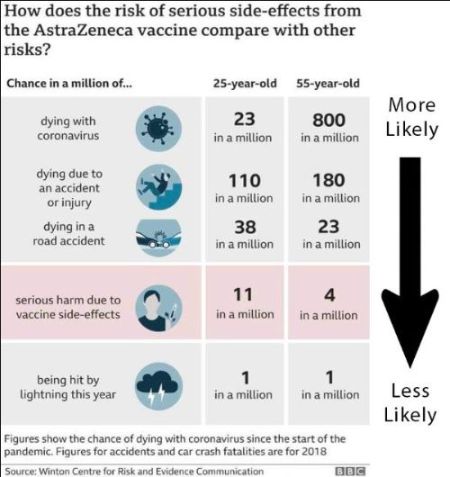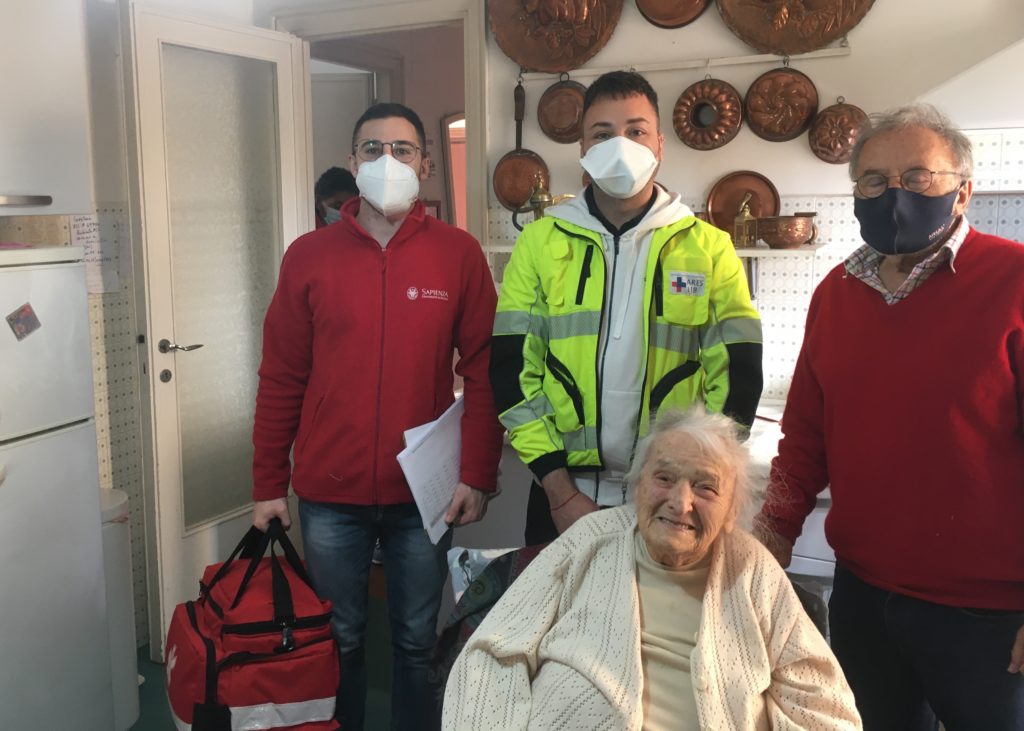Volcanoes are erupting in The Philippines, but on-fire Australia received some welcome rain. The Iran war cries have been called off and The Donald’s military powers are about to be hamstrung by the Senate. Meanwhile, his impeachment trial is starting, and we’re all on Twitter for a front-row seat.
Bye, Cancer
Our latest newsletter takes a look at a big development for cancer screenings, Biden's plan to withdraw from Afghanistan, (rare) concerns regarding the Johnson & Johnson vaccine, and more.
This is our weekly newsletter, What Could Go Right? Sign up here to receive it in your inbox every Thursday at 6am. You can read past issues here.
The new mRNA technology may revolutionize medicine, and there has been heaps of well-deserved coverage of that. Here’s another piece of eye-popping medical news that is flying under the radar: a new cancer screening that can be done with a blood draw at your annual physical. Only ten years ago, the tech seemed impossible to achieve.
Instead of relying on biopsies, scans, or endoscopies—and instead of giving up on certain cancers that currently can’t be screened at all—a handful of companies are developing what’s called a liquid biopsy, a blood test that can detect cancer. One company, Grail, is planning to launch theirs, which covers 50 different kinds of cancer, within months. Their goal is to prevent nearly 40% of cancer deaths among those screened. (Two side notes: it’s a Barron’s article, so investors, take note, and thanks to reader Alaina, who sent this story in.)
In other cancer news, the common cold is finally useful for something: researchers are studying a new method that combines a common cold virus with an immunotherapy drug to shrink inoperable melanoma tumors. Next steps include seeing whether patients whose tumors did shrink can be candidates for surgery to remove the tumors entirely.
Since there is a lot of concern out there around the safety of the Johnson & Johnson vaccine, a few helpful links. Quartz with a list of all the things that carry a higher risk of blood clots, including flying and taking birth control. The Washington Post with a nifty tracker that shows all the J&J vaccinations as grey dots, the lives saved from COVID-19 due to the J&J vaccine as blue dots, and the blood clot complications as red dots. (Spoiler, although we do recommend taking a look at the article: the point is you have to watch the tracker for over three hours before a red dot appears, but blue dots appear almost immediately.) And a Twitter thread collecting positive vaccination stories.
Cheers to our readers in the UK, where one survey found that instead of anti-vaxx fears materializing and stunting vaccination progress, 94% of adults feel positively about the coronavirus vaccines, with many of those previously unwilling to take them changing their mind.
A couple follow-ups from last week: First, we’re feeling prescient about asking whether Biden might end endless wars, given that he’s announced a September pullout from Afghanistan. The war there has cost tens of thousands of Afghan civilians and thousands of US service members their lives, as well as trillions of dollars. “It’s tremendously encouraging,” said Quincy Institute’s Stephen Wertheim in this Rolling Stone piece that asks some questions about what might come next, both for US foreign policy and for Afghanistan. Embedded in there is the not-insignificant fact that ending US military intervention is hugely popular on the right and on the left. And here’s an optimistic take on Afghanistan’s future from the United Nations Development Programme representative for Afghanistan.
Second, TPN Member David Brooks is on the “good news about good mental health train” with us, recently tweeting about the low 2020 suicide rates. It feels especially important to correct the record on that given that it’s high on the list of what’s stressing Americans out. In a new graph from Statista, worry over high suicide rates takes fifth place, coming in under only the pandemic, healthcare, mass shootings, and climate change.
Below in the links section, The Economist’s package about why workers are going to hold the power soon, the modern solution of AI and machine learning to the biblical problem of locust swarms, a much-improved president for Tanzania, and more.

From us: Though not as flashy as the “stimmies” we all know and love, the expansion of the Child Tax Credit could be a real game changer. It’s expected to reduce child poverty by nearly half, putting the woefully-behind US in the company of wealthy countries that offer parents assistance with the costs of raising children. How will it work and what progress might come next? Find out in our latest Progress in 5 Minutes.
Progress, Please
(Found good news? Tweet at us @progressntwrk or email.)
TPN picks: our suggested reads and listens this week 🤓
- If peace is achieved soon, Afghanistan can face the future with optimism | The Diplomat
- A golden age for labor? Riding high in a workers’ world | The Economist
- A dark pandemic year could still portend a brighter future | Charles Kenny
- The tech squashing locust swarms in east Africa | The NY Times
- A window for change in Tanzania | Rest of World
- Let’s make our public spaces beautiful | Jacobin
TPN Member originals ![]()
- Concerned about partisanship? Here’s how the “Unum Test” can reunite America | Jonathan Haidt
- A pep talk from Steven Pinker | John Horgan
- How to resolve a conflict when you hate your opponent’s guts | Yascha Mounk
- Keeping trans kids from medicine doesn’t make them disappear | Jennifer Finney Boylan
- Economic growth and the fight against conformity and mediocrity | Tyler Cowen
- Tim Shriver’s call to unite | John Wood, Jr.
- Bryan Doerries: “you are not alone across time” | Krista Tippett
- Being a good partner with Esther Perel | Scott Galloway
- The future is Asian | Parag Khanna
Other good stuff in the news
- America’s boom has begun. Can it last? | The Economist
- Saudi Arabia plants to cut carbon emissions by 60% and plant 50 billion trees (h/t to Future Crunch) | Arab News
- Bhutan vaccinates 93% of adults in 16 days | Associated Press
- New app gives killer viruses a “credit rating” to prevent future pandemics | Telegraph
- How the pandemic helped build a burgeoning home testing industry | STAT News
Upcoming Events
Futureproof: 9 Rules for Humans in the Age of Automation | Erik Brynjolfsson | April 15
Fireside Chat with Biden’s National Climate Advisor | Bina Venkataraman | April 19
The Social Media Summit at MIT | Andrew McAfee & Eli Pariser | April 22
New Member Alert

Economist Noreena Hertz is on a quest to reconnect us. Her latest book, The Lonely Century: Coming Together in a World That’s Pulling Apart, posits thatloneliness is the defining condition of the twenty-first century. The culprits? Technology, yes, but also the dismantling of civic institutions, the radical reorganization of the workplace, mass migration to cities, and decades of neoliberal policies.
Named by The Observer as “one of the world’s leading thinkers” and by Vogue as “one of the world’s most inspiring women,” Noreena is an honorary professor at University College London. Her previous books are The Silent Takeover, The Debt Threat, and Eyes Wide Open.
Welcome, Noreena. You can read more about her work here.
Vaccination Selfie of the Ages

When we asked our readers to send us their vaccination selfies, we were not expecting to receive anything close to this level of incredible. TPN Member Deborah Fallows sent us this shot of 107-year-old Leontina Garau, of Rome, Italy, receiving her first dose of the Pfizer vaccine!
Nonna, as she’s affectionately called, is homebound, and in Rome, vaccines are still very hard to come by. A doctor (the one in red) and a nurse (yellow) came to Nonna’s apartment to administer the dose in her kitchen on Monday, April 5.
On the right is Nonna’s son, Pietro. The photo was taken by Deborah’s sister, Susan Garau, and is shared with permission. Nonna is doing well after her dose. This is her second global pandemic.
🐧We’re not usually an organization that links to elderly men knitting at-risk penguins sweaters, but we couldn’t resist this. . .
See you next week!


